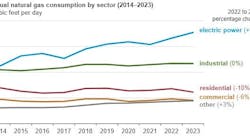Peter Howard Wertheim
OGJ Correspondent
RIO DE JANEIRO, Feb. 1 -- Manuel Morales Olivera, appointed by Bolivia President Evo Morales as the new president of state-owned Yacimientos Petroliferos Fiscales Bolivianos (YPFB) to replace Juan Carlos Ortiz who resigned, is seen by the Brazilian press as being more leftist than his predecessor (OGJ Online, Jan. 30, 2007).
YPFB's 2005 statute stipulates that only a professional with at least 10 years experience as a large corporation executive and at least 5 years experience in the energy sector can head YPFB. Olivera does not have this experience. His professional background includes heading his family's printing company and serving as a top Morales aide when the new president took office in early 2006 on a radical left platform.
Ortiz is an energy specialist who had worked for the subsidiary of Brazil's state-owned company Petroleo Brasileiro SA (Petrobras) in Bolivia. Petrobras is Bolivia's largest energy company, and imports 26 million cu m/day of gas from the Andean country into Brazil.
The Bolivian Chamber of Hydrocarbons, a private sector organization composed of oil and gas companies operating in Bolivia, considers Olivera more "ideological" than his predecessor, which might affect Bolivia-Brazil negotiations concerning price hikes for gas exported to Brazil.
Hydrocarbons Minister Carlos Villegas said Olivera must complete the state's recovery of four oil companies partially privatized in the 1990s, seek a higher price for natural gas sold to Brazil, and boost gas exports to Argentina in 2010 via a pipeline set for construction.
"I'd like to remember at this moment those who fell in the fight for nationalization—the dead and the wounded," Olivera said after being named to the post. The nationalization of Bolivia's natural gas, announced May 1 by President Morales, did not involve bloodshed but the state's renegotiation of contracts with foreign oil and gas companies so that Bolivia received a greater share of revenues.
